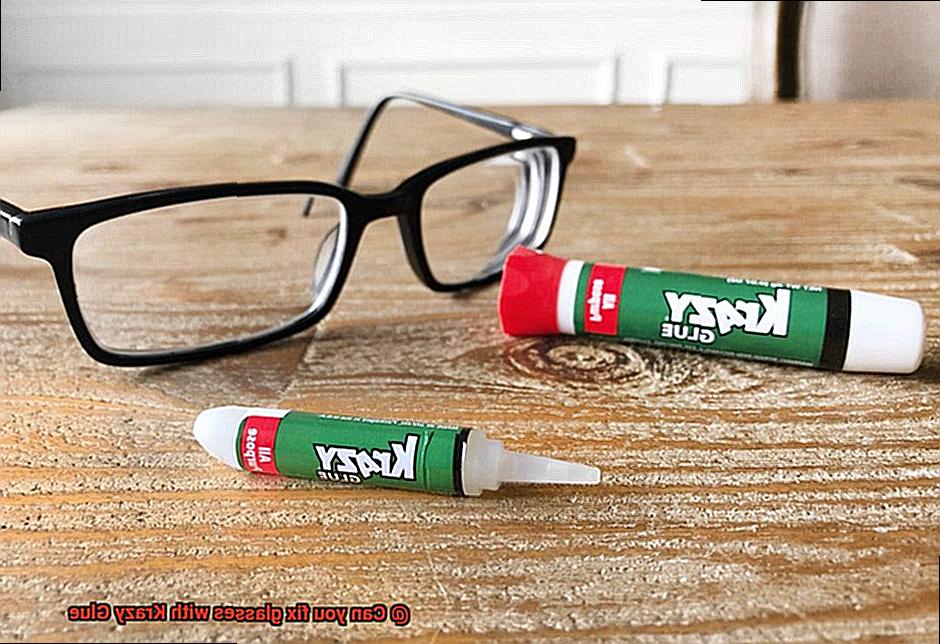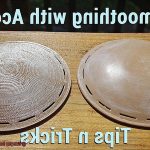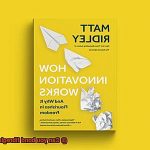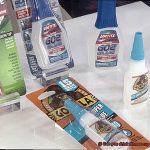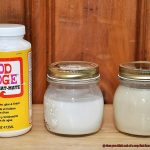Picture this: you’re going about your day, rocking your favorite pair of glasses, when suddenly disaster strikes. Snap. Your precious frames are broken in two. It’s a gut-wrenching moment we’ve all experienced at some point. But before you start mourning the loss and digging into your wallet for a replacement, have you ever considered the power of Krazy Glue to bring your spectacles back to life?
In this blog post, we’re diving headfirst into the world of DIY glasses repairs with everyone’s favorite adhesive – Krazy Glue. Is it really as magical as they say? Can it truly save your beloved eyewear from an untimely demise? Well, grab a cozy seat, sip on your favorite beverage, and let’s embark on this journey together to uncover the truth behind fixing glasses with Krazy Glue.
What is Krazy Glue?
Contents
- 1 What is Krazy Glue?
- 2 Types of Glasses Frames
- 3 Is Krazy Glue Suitable for Repairing Glasses?
- 4 Pros and Cons of Using Krazy Glue on Glasses
- 5 Professional Advice Before Attempting Repairs
- 6 Applying Krazy Glue to Glasses Frames
- 7 Avoiding Damage to the Lenses
- 8 Undoing Damage Caused by Super Glue
- 9 Conclusion
When it comes to adhesive solutions, Krazy Glue reigns supreme. This extraordinary brand of super glue delivers a swift and unwavering bond for an array of materials. In this article, we will delve into the world of Krazy Glue, uncovering its captivating nature, common uses, and essential factors to consider.
Prepare to be amazed by the sheer power of Krazy Glue. This exceptional super glue boasts an unrivaled ability to form strong bonds. Its secret lies in its cyanoacrylate formula, which enables it to forge rapid and enduring connections. With a remarkable versatility, Krazy Glue can adhere to diverse materials including glass, metal, plastic, ceramic, and so much more.
Common Uses:
- Repairing broken items: Embrace your inner handyman with Krazy Glue as your trusty companion. It effortlessly mends shattered ceramic figurines, delicate jewelry pieces, and even those pesky household appliances that refuse to cooperate.
- Bonding small parts together: Whether you’re tinkering away on a DIY endeavor or rescuing a toy from the depths of disarray, Krazy Glue securely unites minuscule components with unwavering strength.
- Crafting projects: Crafters rejoice. Krazy Glue is an indispensable asset for artistry. From assembling intricate models that defy imagination to crafting personalized jewelry that dazzles the senses, this adhesive’s precision application and rapid drying properties ensure unparalleled productivity.
- Household fixes: When life throws you a loose handle or a cracked tile, fear not. Krazy Glue steps in as the ultimate problem solver, providing temporary respite until professional repairs can be made.
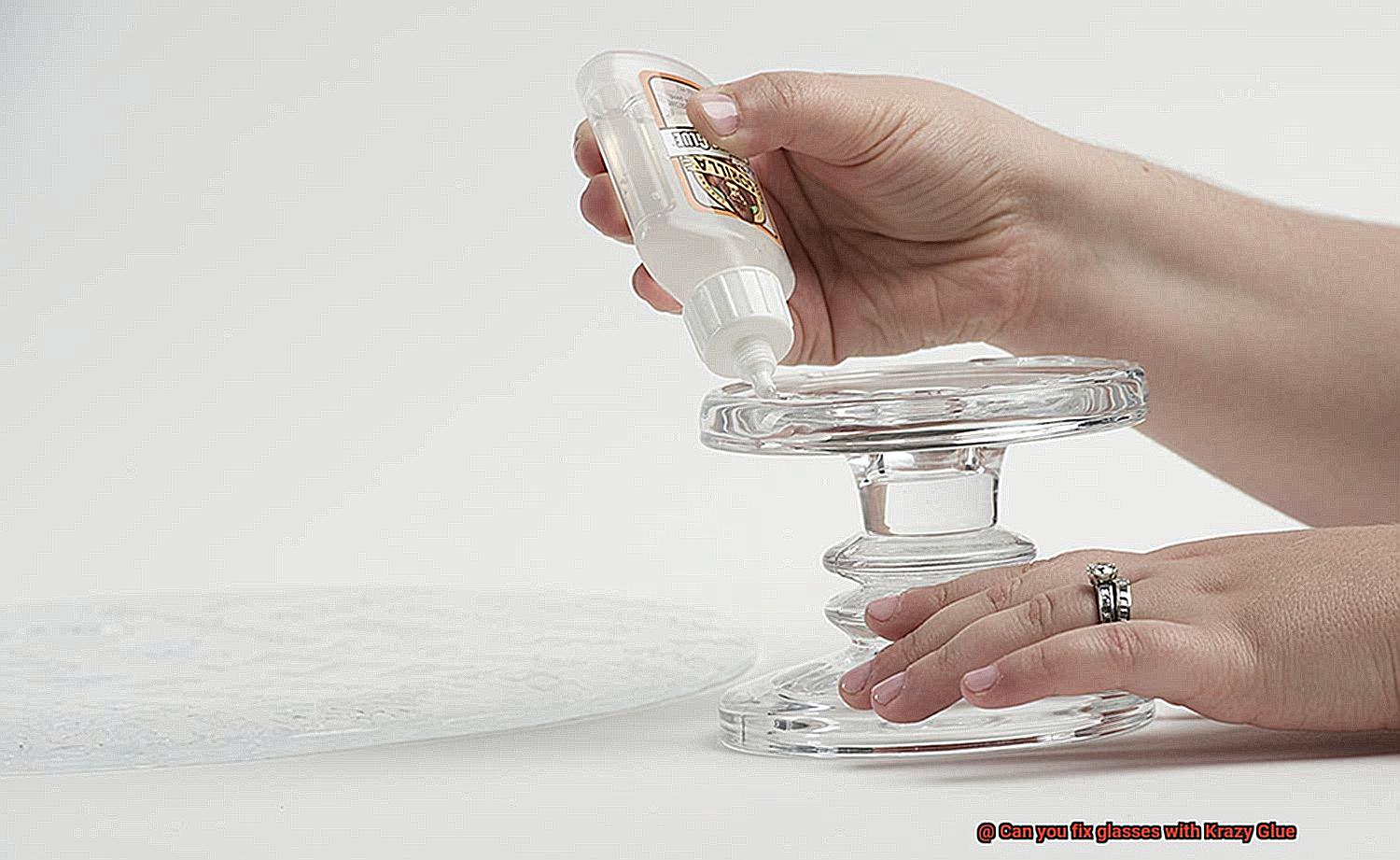
Important Considerations:
- Handle with caution: Like a double-edged sword, the power of Krazy Glue demands respect. Beware of its ability to bond skin and unintended surfaces with ruthless efficiency. Keep your skin and eyes safe by exercising caution during use.
- Choose the right material: Not all materials are created equal when it comes to bonding with Krazy Glue. Seek expert assistance for delicate tasks such as repairing plastic frames on glasses to avoid potential damage or unsightly discoloration.
- Seek professional advice: In moments of uncertainty, the wise seek guidance from those in the know. When unsure about employing Krazy Glue for a particular repair, it is always best to consult an expert. Their wisdom will guide you towards the most suitable solution for your needs.
Types of Glasses Frames
When it comes to glasses frames, there are so many options to choose from. Each type has its own unique features and characteristics. The material of the frame can affect how durable and functional your glasses are. Let’s explore the different types of glasses frames available in the market and find the perfect one for your style and lifestyle.
Metal frames:
Metal frames are strong and durable, perfect for active people. They are typically made of stainless steel or titanium, which makes them resistant to corrosion and able to withstand daily wear and tear. Metal frames are also lightweight and flexible, ensuring a comfortable fit throughout the day. However, they can be more expensive and not as customizable in terms of color and design compared to other materials.
Plastic frames:
Looking for an affordable option? Plastic frames are budget-friendly and come in a wide range of colors and designs. Made of materials like acetate or nylon, these frames are lightweight and comfortable to wear. They offer ample customization options, allowing you to express your personal style. However, plastic frames may not be as durable as metal frames and can break or crack if not handled carefully.
Titanium frames:
If you have sensitive skin or allergies, titanium frames are a great choice. These frames are lightweight, strong, and hypoallergenic. They provide excellent durability while offering comfort throughout the day. Although titanium frames may be more expensive than other options, their longevity and skin-friendly properties make them worth considering.
Rimless frames:
For a sleek and minimalist look, go for rimless frames. These frames have no visible frame around the lenses, giving you a sophisticated appearance. Rimless frames are lightweight and provide an unobstructed view. However, they require more careful handling as they can be more prone to lens breakage.
Semi-rimless frames:
Want the best of both worlds? Semi-rimless frames have a frame on the top half of the lenses while leaving the bottom half rimless. This design offers durability like framed frames and the aesthetic appeal of rimless ones. Semi-rimless frames are stylish and versatile, making them a popular choice among many individuals.
Other materials:
If you’re looking for something unique, there are frames made from wood, bamboo, and even carbon fiber. These materials offer different aesthetics and eco-friendly options. Wooden frames have a natural and warm appearance, while bamboo frames have a lightweight and sustainable appeal. Carbon fiber frames are incredibly durable and lightweight, perfect for those who want a modern and high-tech look.
Is Krazy Glue Suitable for Repairing Glasses?
When it comes to repairing glasses, choosing the right adhesive is crucial for a durable and reliable fix. While Krazy Glue may be a popular choice for various repair purposes, it may not always be the best option for fixing glasses. Here’s why:
- Material Compatibility: The type of glue that works best for repairing glasses depends on the material of the frame. For metal frames, soldering or welding techniques are generally recommended as they provide a stronger and more durable bond. Krazy Glue, known for its strong bond and quick-drying properties, may not adhere well to certain types of plastics commonly used in glasses frames.
- Longevity: While Krazy Glue can create a strong bond initially, it may not provide a long-lasting solution for glasses repairs. Over time, the bond created by Krazy Glue can weaken, leading to the need for further repairs or replacements. This can be inconvenient and costly in the long run.
- Difficulty in Future Repairs: The strong bond created by Krazy Glue can make future repairs or adjustments difficult or even impossible. If you need to replace a broken hinge or adjust the fit of your glasses, using Krazy Glue can make these tasks challenging for both you and a professional optician. This lack of flexibility can limit options for future maintenance.
- Lens Damage: It is highly discouraged to use Krazy Glue on glasses lenses. The adhesive can damage lens coatings and affect vision quality, rendering your glasses unusable. Protecting the integrity of your lenses should be a top priority when considering any repairs.
Considering these factors, it is always recommended to consult with a professional optician or eyeglass repair specialist for any significant repairs or replacements needed for glasses frames. They have the expertise and knowledge to choose the right adhesive based on the specific materials and damage involved.
Pros and Cons of Using Krazy Glue on Glasses
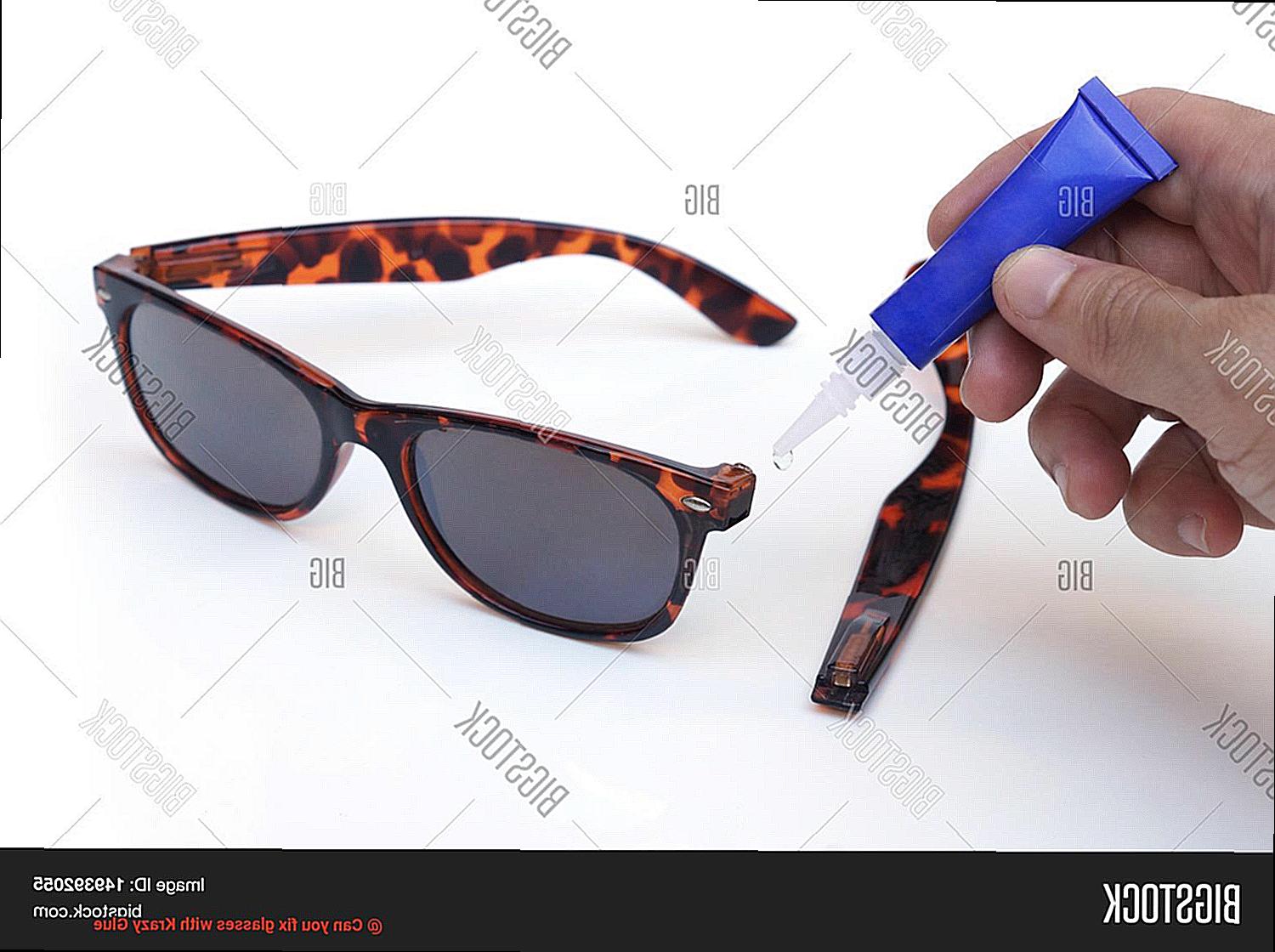
Accidents happen, and when they do, your beloved glasses may end up broken or in need of repair. Before reaching for that trusty tube of Krazy Glue, it’s crucial to consider the pros and cons of using this adhesive on your eyewear. While it may seem like an easy solution, understanding the potential advantages and disadvantages is essential for making an informed decision.
Pros:
- Strong and durable bond: Krazy Glue is known for its exceptional bonding properties. When applied correctly, it can create a sturdy bond, effectively repairing broken frames or loose hinges. This can significantly extend the lifespan of your glasses and save you from the expense of purchasing a new pair.
- Rapid drying time: One of the most significant advantages of using Krazy Glue is its quick drying time. Within seconds, your glasses can be ready to use again. This feature makes it ideal for individuals who rely heavily on their glasses for daily activities and cannot afford to wait for long repair times.
- Cost-effective solution: Professional repairs or buying new glasses can be pricey endeavors. Using Krazy Glue provides an affordable alternative, allowing you to fix minor damages without straining your budget. It offers a cost-effective way to restore functionality to your eyewear.
- Convenience: When immediate access to an eyewear repair shop is unavailable, using Krazy Glue becomes a convenient option. It saves you time and effort by providing a quick fix right in the comfort of your own home. No need to wait for appointments or travel to a specialist – Krazy Glue brings simplicity to the repair process.
Cons:
- Potential lens damage: The primary concern when using Krazy Glue on glasses is the risk of damaging the lenses. If the glue seeps onto the lenses or leaves residue, it can significantly impact visibility and clarity, rendering your glasses less usable. This risk poses a considerable drawback to using Krazy Glue for repairs.
- Limited effectiveness: While Krazy Glue excels at repairing minor breaks or loose parts, it may not hold up well against more significant structural issues. In such cases, professional repairs or even replacement glasses may still be necessary. It is essential to assess the severity of the damage before relying on Krazy Glue as a solution.
- Precision and care required: Applying Krazy Glue to glasses demands precision and care. The adhesive’s strong bonding properties mean that any mistakes during application can be challenging to rectify. Following instructions carefully and avoiding excessive use of the glue is crucial to prevent unintended consequences or further damage.
- Voiding warranties or guarantees: If your glasses are still under warranty, using Krazy Glue may void any warranties or guarantees provided by the manufacturer. To avoid potential problems, it is advisable to consult with the manufacturer or an authorized repair center before attempting any DIY repairs.
Professional Advice Before Attempting Repairs
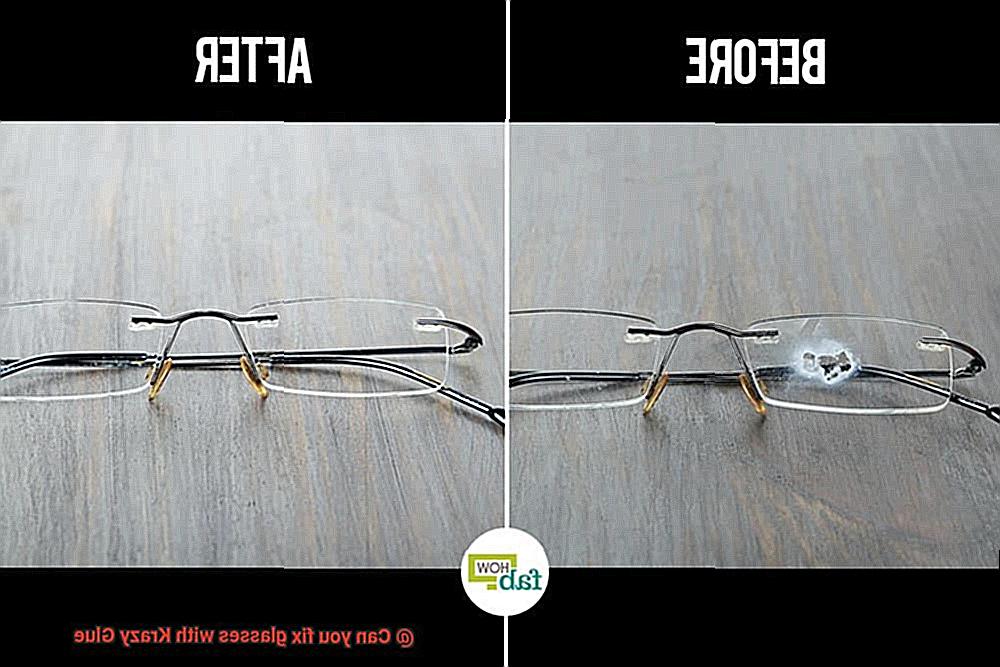
Before attempting any repairs on your glasses using Krazy Glue, it is crucial to seek professional advice. Opticians and eyeglass repair professionals have the knowledge and expertise to evaluate the damage and provide appropriate solutions. Here’s why seeking their advice is so important:
- Different materials require different approaches: Glasses can be made of plastic, metal, or a combination of both. Each material has its own unique properties, and using the wrong adhesive or repair method can cause further damage. Professionals can determine the best approach based on the material of your frames.
- Assessing repair feasibility: Professionals can evaluate whether the damage is repairable or if it requires specialized tools that you don’t have at home. They can save you time, money, and frustration by giving you a realistic assessment of whether it’s worth attempting a repair or if it’s better to invest in a new pair.
- Protecting your lenses: Lenses are delicately coated to provide clarity and protection. Certain adhesives can damage or cloud them, compromising your vision. Opticians can advise on whether using Krazy Glue is suitable for your specific lens type, ensuring that you don’t inadvertently ruin your glasses while trying to fix them.
- Preserving warranties and guarantees: Attempting DIY repairs without professional advice could potentially void any warranties or guarantees you have on your glasses. Manufacturers often have specific guidelines for repairs, so deviating from those guidelines might leave you high and dry if something else goes wrong down the line.
Applying Krazy Glue to Glasses Frames
You’re faced with a decision – should you try to fix it yourself with Krazy Glue or seek professional help? Fear not. In this article, we will delve into the world of gluing glasses frames and provide you with expert guidance on whether Krazy Glue is the right solution for your eyewear woes.
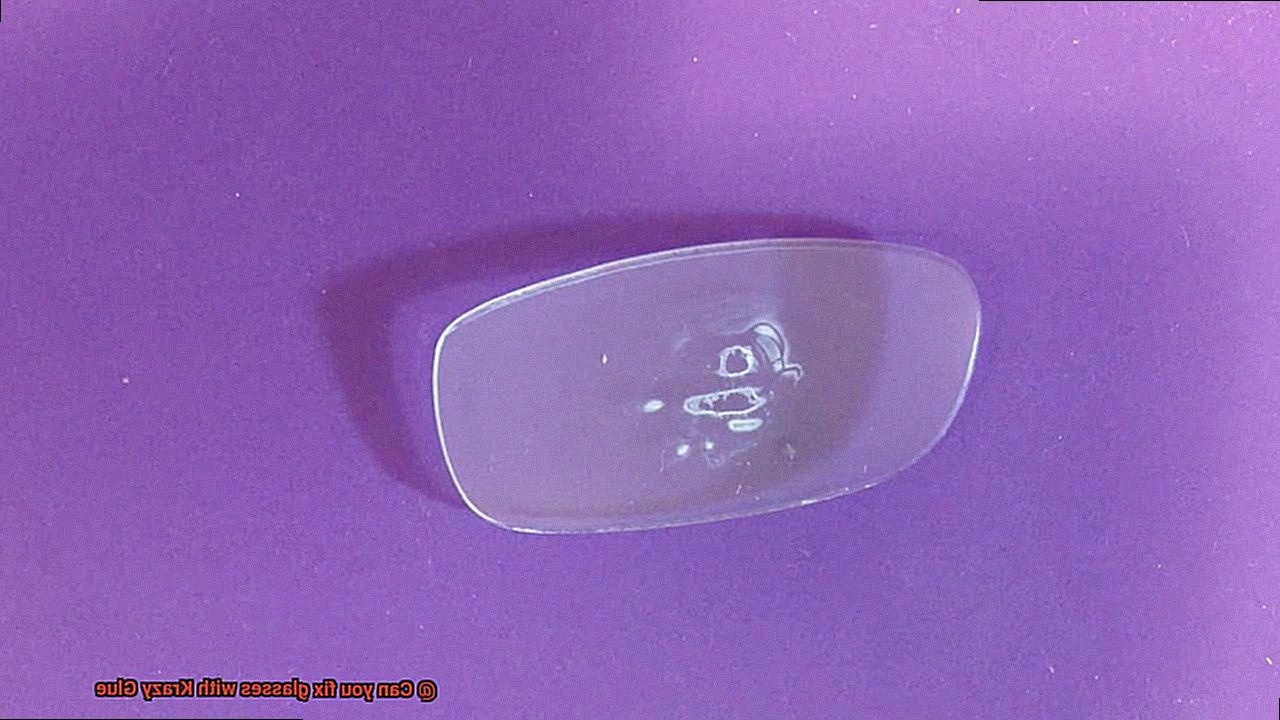
The Dos and Don’ts of Applying Krazy Glue to Glasses Frames:
- Cleanliness is Key: Before applying any glue, ensure that the area requiring repair is squeaky clean. This step is crucial as it guarantees a pristine surface for the adhesive to bond effectively.
- Use Sparingly: It’s vital to use only a small amount of Krazy Glue on the broken parts of the frame. By doing so, you prevent excess glue from oozing out and potentially damaging other components of your glasses.
- Precision Application: When using Krazy Glue, exercise precision and ensure that it adheres solely to the broken parts. Avoid spreading it onto other areas of the frame to maintain its structural integrity.
- Firmly Hold Together: After applying the glue, firmly hold the broken parts together for approximately 30 seconds to a minute. This allows ample time for the adhesive to form a strong bond.
- Patience is Key: Once the bonding time has passed, exercise patience and let the glue dry completely before using your repaired glasses. Refer to the instructions on the Krazy Glue packaging for accurate drying times.
Considerations and Limitations:
- Temporarily Temporary Fix: While Krazy Glue can provide a temporary fix for glasses frames, it may not offer a permanent solution. Keep this in mind when deciding whether to go the DIY route.
- Material Matters: Different glasses frames are constructed from various materials, such as plastic or metal. It is essential to consider the material before attempting any adhesive application. If unsure, seek professional advice.
- Moisture and Stress: Remember that Krazy Glue can degrade over time, especially when exposed to moisture or excessive stress. For significant damage or delicate materials, it is advisable to consult professional repair services.
- Expert Consultation: Opticians and repair professionals are your best allies when it comes to fixing glasses frames. They possess the knowledge and tools to accurately assess the damage and provide appropriate solutions.
Avoiding Damage to the Lenses
We’ve all experienced the frustration of a broken pair of glasses. Whether it’s a loose screw or a cracked frame, the last thing we want is to cause further damage, especially to the lenses. To help you avoid these mishaps, this article will provide essential tips and tricks for protecting your lenses during repairs, ensuring a successful fix without compromising the integrity of your glasses.
Handle with Care:
When dealing with fragile glasses, handle them with utmost care. Avoid applying excessive force during the repair process, as this can lead to irreparable damage such as cracks or breaks in the lenses.
Precise Application:
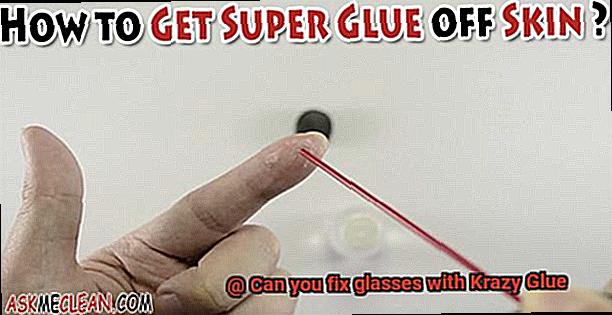
To prevent glue from coming into contact with the lenses, apply adhesive only to the specific area that needs fixing. Use a small piece of tape or a protective barrier to cover the lenses, ensuring they remain glue-free and residue-free.
Less is More:
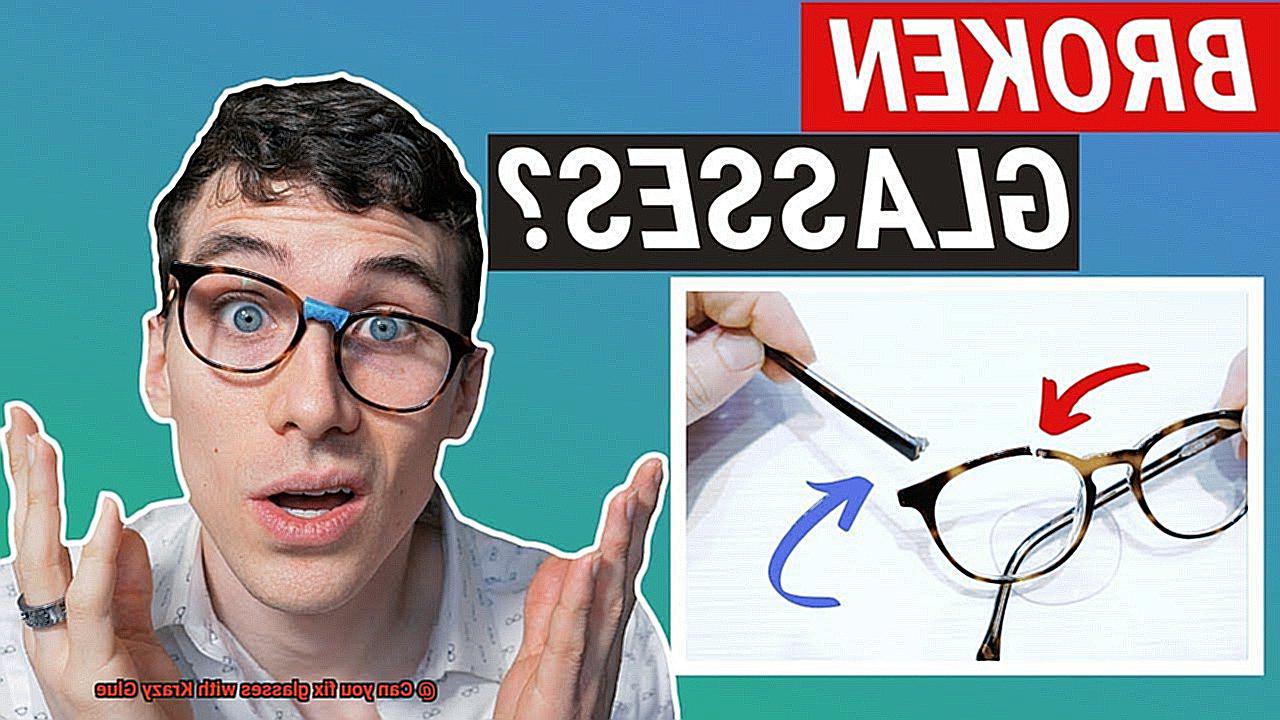
Using too much glue can lead to messy spills and damage to your lenses. Instead, use a tiny drop or two of adhesive for minor repairs. This prevents excess glue from spreading onto the lenses and affecting your visual experience.
Patience is Key:
Allow ample time for the adhesive to dry completely before handling your glasses again. Rushing the drying process can result in accidental movement or misalignment of the repaired parts, potentially requiring reapplication or causing further damage.
Know the Limits:
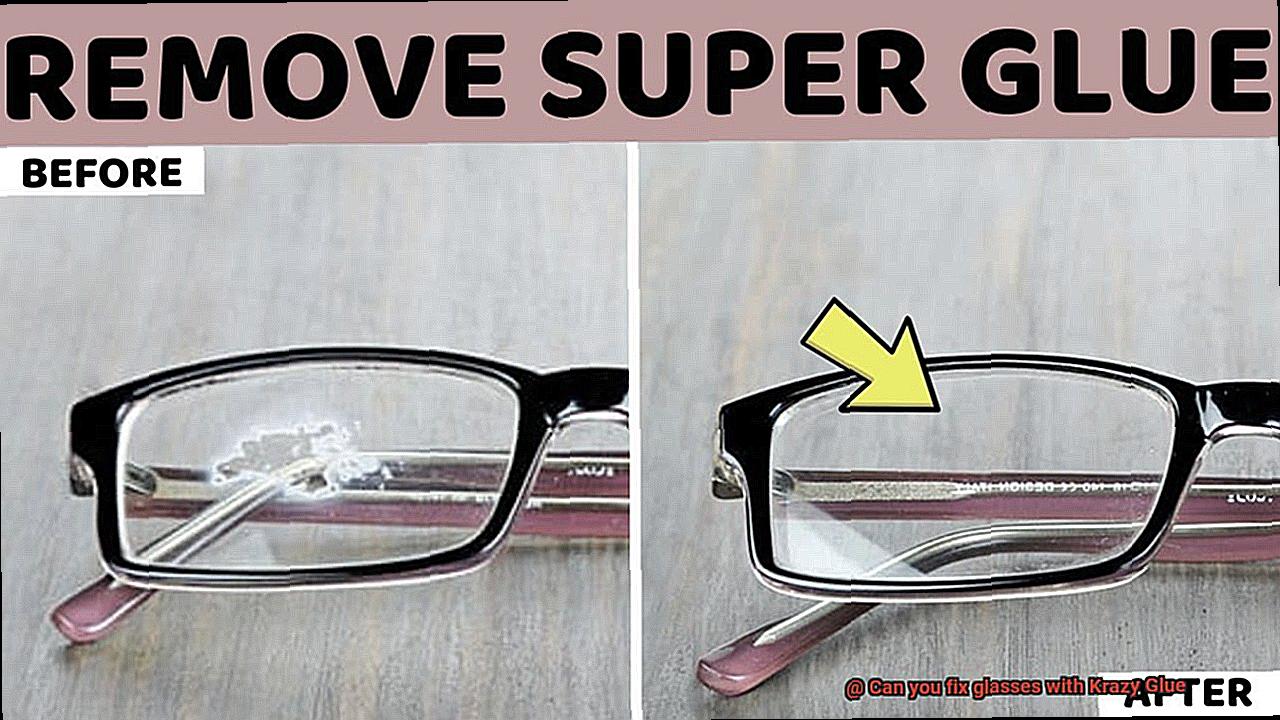
While some adhesives may work for minor repairs, they are not specifically designed for fixing glasses. Complex repairs or significant damage should be left to professionals who specialize in eyeglass repair. Consult an expert for advice and ensure lasting fixes without risking further damage.
Undoing Damage Caused by Super Glue
As an expert in all things super glue-related, I’m here to give you the inside scoop on how to undo the damage caused by this adhesive nightmare.
First, let’s address the types of damage that super glue can cause. If you have plastic or acetate frames, using super glue can make them brittle and prone to cracking. And let’s not forget about the unsightly residue and discoloration it can leave behind. Yikes.
Here are five steps to get your glasses back in tip-top shape:
- Acetone to the rescue: Acetone, found in nail polish removers, is great for dissolving super glue. Dip a cotton swab or cloth in acetone and gently rub the affected area. Just be sure to steer clear of the lenses – we don’t want any accidental damage.
- Warm soapy water: Soak your glasses in warm soapy water for a few minutes to soften the super glue. Then, use your fingers or a soft cloth to gently peel away the glue from the frame. Easy does it – no need for excessive force.
- Isopropyl alcohol magic: Isopropyl alcohol is another superhero when it comes to dissolving super glue. Apply a small amount to a cloth or cotton swab and gently rub the affected area until the glue starts to loosen. This method works wonders for removing residue too.
- Super glue remover: If you want a specialized solution, there are products out there designed specifically to remove super glue. Just follow the instructions and use it sparingly – we don’t want to damage those precious frames.
- Seek professional help: When all else fails or if the damage is extensive, it’s time to call in the pros. An optician or eyewear repair specialist will have the know-how and tools to safely fix your glasses without any further mishaps.
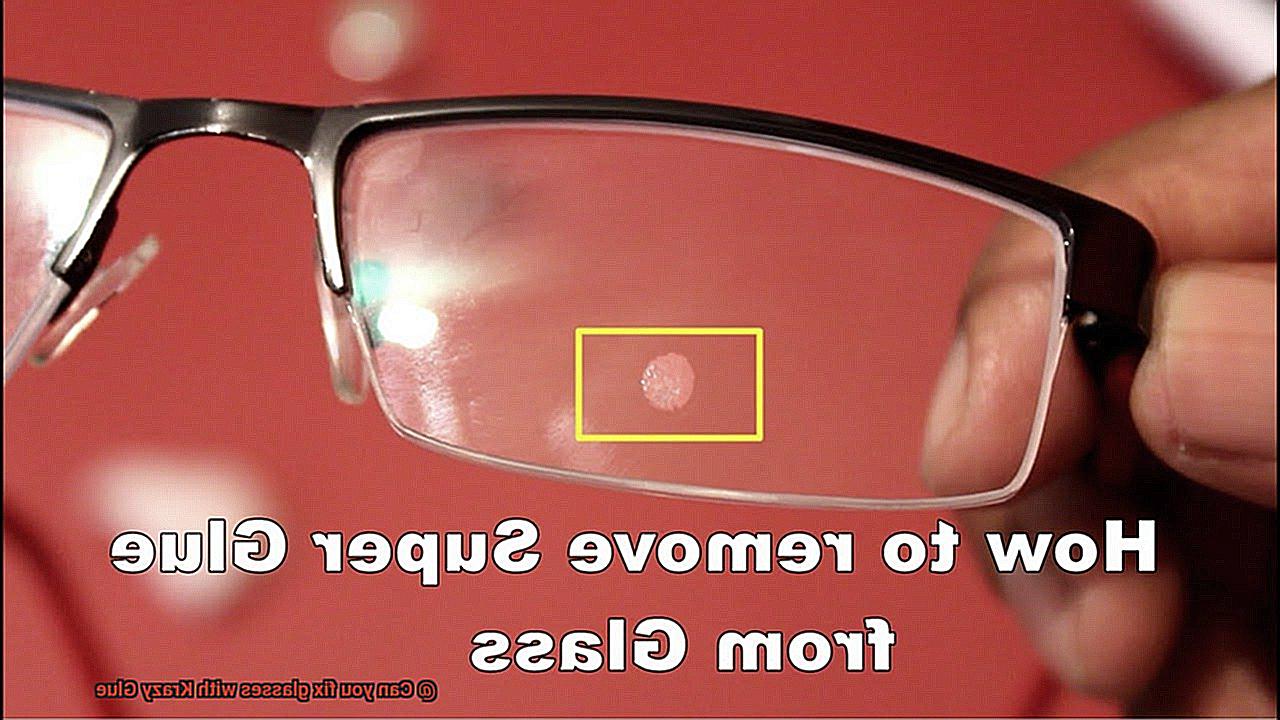
Remember, prevention is always better than cure. Handle your glasses with care and avoid using super glue as a quick fix unless absolutely necessary.
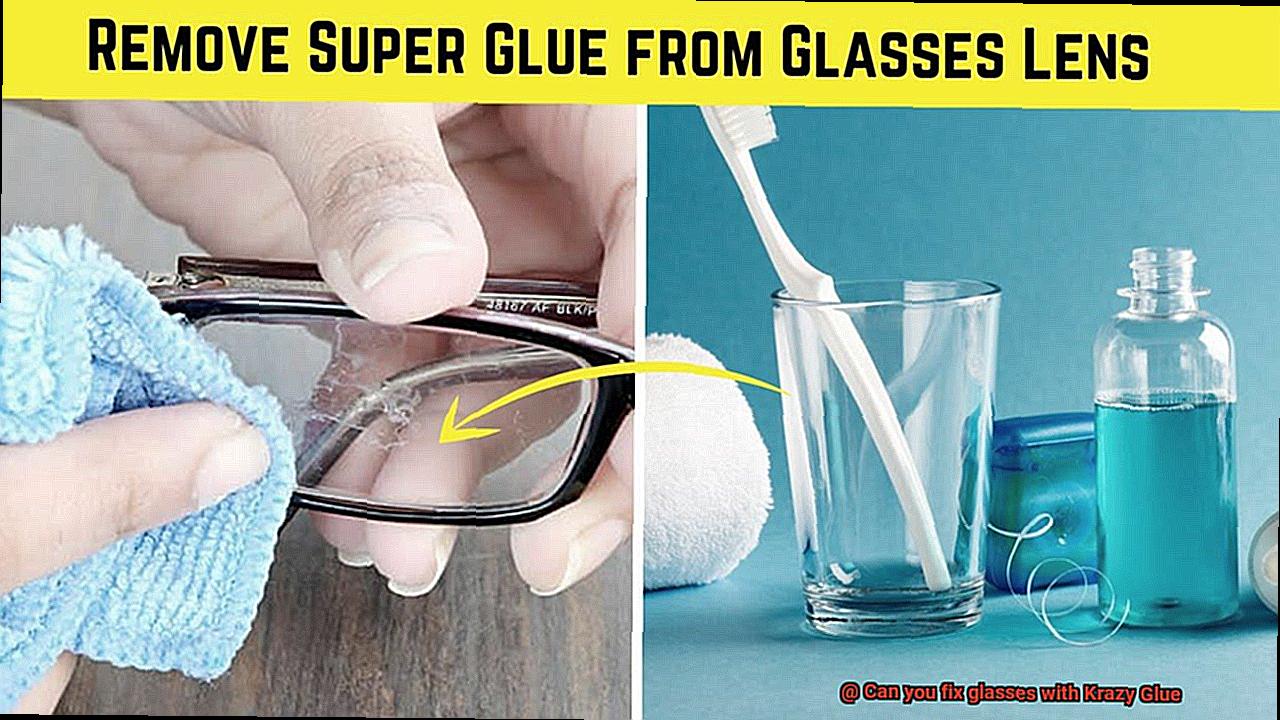
Rcpk83xY96o” >
Also Read: Is Krazy Glue Toxic?
Conclusion
Krazy Glue, a powerful adhesive known for its strength and versatility, has long been hailed as a go-to solution for fixing various items. But when it comes to repairing glasses, can this wonder glue truly work its magic? The answer may surprise you.
In the realm of eyewear mishaps, broken frames can be a common occurrence. Whether it’s an accidental drop or a clumsy mishap, the result is often a frustratingly fractured pair of glasses. It’s in these moments that many people turn to Krazy Glue for salvation.
With its promise of bonding almost anything with precision and speed, Krazy Glue seems like the perfect candidate for resurrecting your beloved spectacles. However, before embarking on this adhesive adventure, it’s important to proceed with caution.
While Krazy Glue does possess impressive adhesive properties, its application to glasses requires careful consideration. The delicate nature of eyewear demands a gentle touch and meticulous attention to detail. One wrong move could lead to irreversible damage or unsightly residue.
Before attempting any repairs, it’s crucial to assess the severity of the damage. If your glasses have suffered a minor break or a loose hinge, Krazy Glue may indeed come to the rescue. Its quick-drying formula and strong bond can provide temporary relief until professional assistance is obtained.
However, it’s essential to remember that Krazy Glue is not specifically designed for repairing eyewear. Its composition may not be compatible with certain materials commonly found in glasses frames. Additionally, using excessive amounts of glue or applying it haphazardly can result in unwanted side effects such as clouded lenses or impaired functionality.
In conclusion, while Krazy Glue possesses remarkable capabilities in many realms of repair, fixing glasses requires caution and consideration. It can serve as a temporary solution for minor issues but should never replace professional assistance when dealing with significant damage.
When faced with broken eyewear, it’s always advisable to seek the expertise of an optician or eyewear professional. They possess the knowledge and specialized tools needed to ensure a proper and lasting repair.
So, before reaching for that trusty tube of Krazy Glue, think twice and weigh the potential risks. After all, your glasses are not just a fashion accessory but a vital tool for your vision.

